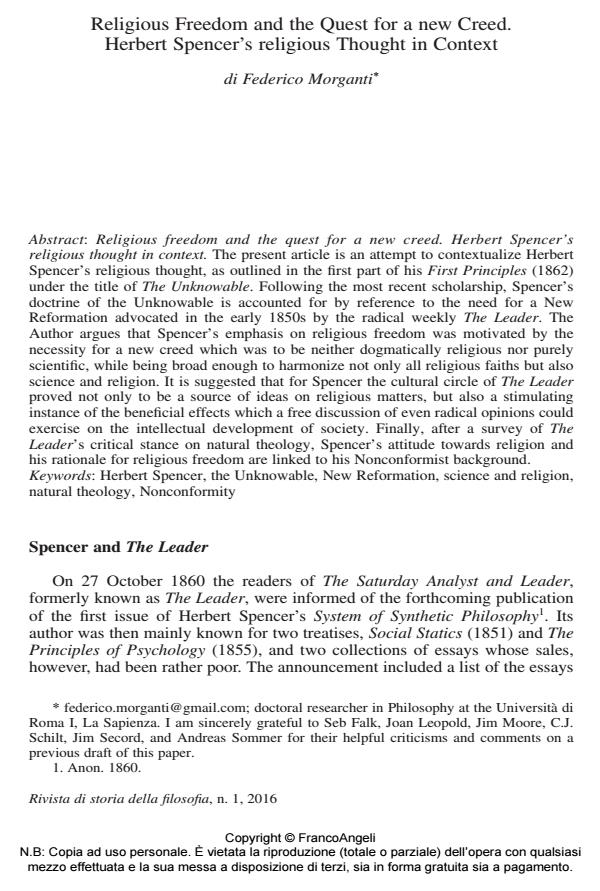Religious Freedom and the Quest for a new Creed. Herbert Spencer’s religious Thought in Context
Titolo Rivista RIVISTA DI STORIA DELLA FILOSOFIA
Autori/Curatori Federico Morganti
Anno di pubblicazione 2016 Fascicolo 2016/1
Lingua Inglese Numero pagine 22 P. 47-68 Dimensione file 576 KB
DOI 10.3280/SF2016-001003
Il DOI è il codice a barre della proprietà intellettuale: per saperne di più
clicca qui
Qui sotto puoi vedere in anteprima la prima pagina di questo articolo.
Se questo articolo ti interessa, lo puoi acquistare (e scaricare in formato pdf) seguendo le facili indicazioni per acquistare il download credit. Acquista Download Credits per scaricare questo Articolo in formato PDF

FrancoAngeli è membro della Publishers International Linking Association, Inc (PILA)associazione indipendente e non profit per facilitare (attraverso i servizi tecnologici implementati da CrossRef.org) l’accesso degli studiosi ai contenuti digitali nelle pubblicazioni professionali e scientifiche
Religious freedom and the quest for a new creed. Herbert Spencer’s religious thought in context. The present article is an attempt to contextualize Herbert Spencer’s religious thought, as outlined in the first part of his First Principles (1862) under the title of The Unknowable. Following the most recent scholarship, Spencer’s doctrine of the Unknowable is accounted for by reference to the need for a New Reformation advocated in the early 1850s by the radical weekly The Leader. The Author argues that Spencer’s emphasis on religious freedom was motivated by the necessity for a new creed which was to be neither dogmatically religious nor purely scientific, while being broad enough to harmonize not only all religious faiths but also science and religion. It is suggested that for Spencer the cultural circle of The Leader proved not only to be a source of ideas on religious matters, but also a stimulating instance of the beneficial effects which a free discussion of even radical opinions could exercise on the intellectual development of society. Finally, after a survey of The Leader’s critical stance on natural theology, Spencer’s attitude towards religion and his rationale for religious freedom are linked to his Nonconformist background.
Parole chiave:Herbert Spencer, the Unknowable, New Reformation, science and religion, natural theology, Nonconformity
Federico Morganti, Religious Freedom and the Quest for a new Creed. Herbert Spencer’s religious Thought in Context in "RIVISTA DI STORIA DELLA FILOSOFIA" 1/2016, pp 47-68, DOI: 10.3280/SF2016-001003